love your neighbor
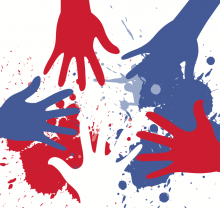
Listening to several Fourth of July discussions last week, I was struck by how many people think of freedom as the ability to do whatever they want. They think there should be few, if any, restrictions on what they choose to do or what they want to own.
A coalition of United Methodists has decided not to host an event planned for the summer 2015 in Atlanta due to "racially offensive practices" of the Atlanta Braves.
The Love Your Neighbor Coalition consists of ten “official” and “unofficial” caucus organizations of The United Methodist Church, including the Native American International Caucus of United Methodists, Affirmation: United Methodists for LGBTQ Concerns, and Black Methodists for Church Renewal, among others.
The group sent letters to Atlanta Mayor Kasim Reed’s Communications Office received a letter (via email) from the Love Your Neighbor Coalition explaining why their coalition of ten United Methodist-related caucus groups have changed initial plans to hold an event in Atlanta in the summer of 2015. Members of the Metro Atlanta Chamber and the Atlanta Braves Executive Offices also recieved emails.
The letters included this message:
“While we give thanks that the Atlanta Braves organization has changed its mascot from ‘the screaming Indian, Chief Noc-A-Homa’ to ‘Homer,’ we also note that they have not done anything to remove the offensive caricature of “Chief Noc-A-Homa” from screen savers and Facebook pages that still connect it directly with the Atlanta Braves. If recent news stories about racism within sporting organizations have shown us anything, it is that organizations can attempt to outwardly placate the public while systemically continuing to promote prejudice and racist attitudes through their words, actions and deeds. The use of the name Braves and the symbols of the tomahawk and ‘tomahawk chop’ do nothing but offer up racist and demeaning images and stereotypes of our Native American citizens and friends.”

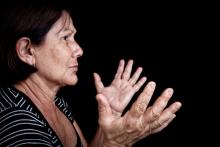
I recently looked out my front door and saw a woman sitting on the stairs of my patio. She was out of breath, sweaty, and had a large basket next to her full of cans and plastic bottles to be recycled. She looked desperately in need of some rest and refreshment. I’m pretty good at ignoring people in need (sadly), but when they come to your physical doorstep, I couldn’t imagine not stepping outside to check on this woman.
Opening our front door, she looked up at me with a bit of concern on her face thinking I might ask her to get off my patio. To calm her nerves, I simply sat down on the steps next to her and we exchanged warm smiles. Because she offered me a greeting in Spanish, I quickly realized she didn’t speak much English and I gave my best shot at speaking in Spanish. Over the next 10 minutes, we simply sat on my patio overlooking the main street of our neighborhood that runs in front of my house. Sometimes we talked, sometimes we just sat in comfortable silence. Her name was Conchetta. Finally, I asked if I could get her some food and a cold drink and she quickly said, “yes.”
After taking in some needed nourishment, Conchetta, offered me a warm smile filled with the richness of humanity and gratitude, and leisurely went back to work assembling the best of our neighborhoods “trash” so she could bring some life to her family.
Our faith community has spent a lot of time over the years becoming students of our neighborhood. As a result, we discovered that roughly 60 percent of our neighborhoods’ residents are Latino (most are Mexican because of our proximity to the border), and a high percentage of those are undocumented. In fact, it’s a safe assumption that my new friend, Conchetta, is undocumented.
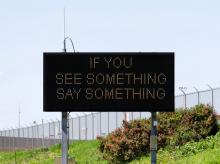
We clearly live in a world that is filled with risks and dangers, and because the increased availability of modern technology allows for harm to occur at unprecedented rates and levels, one can argue that we live in one of the most treacherous eras of human history. However, while the need for protection from harm is both natural and commendable, we are forced to consider whether protection itself can eventually become harmful, unnatural, and even condemnable. In other words, with such extensive resources invested in the pursuit of safety and security, one is forced to consider: What are the consequences of such “protection?" And what happens when so much time and effort is dedicated toward protecting ourselves from our neighbors that we eventually lose sight of who are neighbors actually are? At what point does the heightened priority of protection lead to the increased inevitability of isolation and ignorance? And finally, in our efforts to build impenetrable walls of protection (often in the name of freedom), do we not eventually incarcerate ourselves from the rest of the world and thus limit what it actually means to live free?
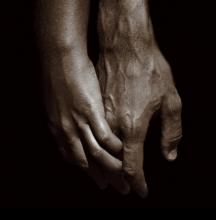
Beyond the realm of churches, religious blogs, and bible colleges, nobody really cares about theology. What does matter is the way you treat other people.
Within Christendom, we’re often taught the exact opposite: that doctrines, traditions, theologies, and distinct beliefs are the only things that do matter. It’s what separates churches, denominations, theologians, and those who are “saved” and “unsaved.”
Historically, Christians have been tempted to categorize the Bible into numerous sets of beliefs that are either inspired or heretical, good or bad, right or wrong — with no room for doubt or questioning or uncertainty.
It’s easy to get caught up in theorizing about God, but within our everyday lives reality is what matters most to the people around us. Theorizing only becomes important once it becomes relevant and practical and applicable to our lives.
When I'm sick, and you bring me a meal, I don't care whether you're a Calvinist or Arminian

After we had shared worship together, I recently had a short conversation with a soldier who had just become more directly aware of Jesus Christ’s call to “love our enemies.” His fervent answer to me as we discussed what we had just heard: “No problem; I can easily love a man while I am killing him!” We did not have time for more words together. I would have liked to ask him about his meaning of love.

I realized that other parents are hoping that I will love and care for their children just as they do. There are so many moments every day when someone else’s child is in my hands. Do I recognize this? Do I choose to see them and love them that way?
In reality, our hands are never empty, even when it feels like we’re letting go of someone so special to us. We open our hands and give our children as a gift to the world. And in the same moment, we find our hands filling up with so many others — the children of others, the parents of others, the brothers and sisters of others.
Will we treat them with the same love and care that we give to our own children and parents and sisters and brothers? Will we treat everyone as family?

Recently I’ve been re-reading Susan Cain’s excellent book, Quiet: the Power of Introverts in a World that Can’t Stop Talking. Extroverts will want to take it with a grain of salt (although some of the book’s speculations suggest that extroverts are fairly thick-skinned about being taken down off their pedestals), but the book is a fascinating exploration of what it’s like to be an introvert in the world, including some analysis about how one gets to be an introvert, anyway, including how much is genetic, and how much comes from early environment.
It was in reading one of these “nature or nurture?” passages that I first encountered the “orchid hypothesis.” Taking its name from David Dobbs’ 2009 article, “The Science of Success,” published in The Atlantic, the orchid hypothesis essentially argues, as Cain puts it, that:
“… many children are like dandelions, able to thrive in just about any environment. But others, including the high-reactive types that [developmental psychologist Jerome Kagan] studied, are more like orchids: they wilt easily, but under the right conditions can grow strong and magnificent.” (Quiet, 111)
This jumped off the page at me.

“Blessed are the peacemakers, for they will be called the sons [and daughters] of God.” Matthew 5:9
The news cycle, the blogosphere, and social justice advocates often focus upon crisis, tragedy, and pain. Moments of freedom, of healing and hope are often drowned out by the cacophonous sounds of self-interest, fear and danger. Today I’d like to silence that cacophony and trumpet loudly about the brave and humble Antoinette Tuff, a peacemaker filled with the Spirit of God, who faced a gunman with her arsenal of love and compassion and saved a school full of children.
Antoinette Tuff’s faith and courage changed the outcome of history on Tuesday, Aug. 20. It is a day that will not live in infamy. Unlike other days that started on a similar path to violence, families did not grieve the loss of their children to the would-be mass gunman who walked into an elementary school with almost 500 rounds of ammunition. Police were scrambled to the scene, but did not have to evacuate classrooms of frightened children watching for a shooter. In fact, despite the heavily armed suspect and a heavily armed law enforcement response, not one person lost their life.
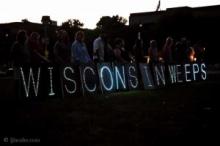
One year after a gunman opened fire in a Sikh temple in Oak Creek, Wis., killing six worshippers, Sikhs say they are hopeful about the future and even more determined to be better understood.
“The legacy of Oak Creek is not one of bloodshed,” said Valarie Kaur, founding director of the interfaith group Groundswell, a project of Auburn Seminary in N.Y.
“[It’s of] how a community rose to bring people together to heal and to organize for lasting social change,” she told the PBS television program “Religion & Ethics NewsWeekly.”
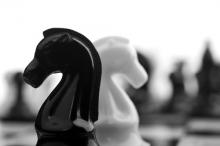
Our church community in Salt Lake City has been going through a series titled “Love God, Love Neighbor.” We’ve been going through Jesus’ famous response to the question, “What must I do to inherit eternal life?” Jesus of course turns the questions back to the man asking, “What is written in the law?” the man responds by saying, “Love the Lord your God with all your heart, soul, and mind, and love your neighbor as yourself.” It appears the man who asks the question — described as either a lawyer or expert of religious law — does not like Jesus’ response very much and so he asks another question. “And who is my neighbor?”
Jesus’ response to the question is perhaps one of the most well-known parables in the Bible: that of the Good Samaritan. But the question, “Who is my neighbor?” is a question we must still wrestle with today, as distressing and upsetting as it most definitely will be.
Who is my neighbor? If we are to examine the parable of the Good Samaritan it appears that Jesus wants to make it clear that our neighbors are everyone, especially — perhaps even specifically — our enemies. So another way of asking the question is, “Who is my enemy?” When I confront the question on a personal level, I realize that even though my neighbors or enemies are perhaps atypical from the norm, I am still called to love them.
Who are my enemies? For me, it’s simple really. My enemies are politicians, Congress, rich people, Wall Street Bankers, rich Christians, and the most hated form of all: “rich, white, Christian politicians.” I jest, but it’s not too far off.

What better way to honor Nelson Mandela on his 95th birthday today than to reflect on his concept of Ubuntu? Ubuntu, a word from the Bantu languages of southern Africa — roughly translated “I am because we are” — sums up Mandela’s approach to leadership, incorporating a generous spirit and concern for the wellbeing of one’s community.

I remember the first time I met someone without papers. They were 12 or 13, like me, and pretty unremarkable and brown. I can still feel the tension between my intense curiosity about this boy and my disappointment about him. Going from “I wonder if they have feelings like us” and “he doesn’t have a green card but does he have a mother who loves him” to “he’s kind of normal” and “this is not what I expected a real-life outlaw to look like” in a few quick minutes.
As life moved on and I made more friends, I met more people who were undocumented. I met grandmothers and little children and some college kids. My relationship with this issue kept transforming, from “I can say I have a friend who’s undocumented SO I KNOW WHAT I’M TALKING ABOUT, OK?” to “I have friends, some of whom don’t have papers, and I’d like to government to be nice to everybody.” The more undocumented immigrants I met, the less they seemed different at all.
It happened that way with abortion, too. And gay marriage. Start out with a simplistic interpretation of the Bible and a black-and-white opinion, befriend somebody at odds with that opinion, the opinion changes. Time after time. I was against women pastors —thanks to Paul and bad exegesis — until I realized that my mother had been spiritually leading people for 20 years and most of them had turned out OK.
I’m sure that if I run for president in 20 years, somebody is going to find a paper I wrote for my Biblical Interpretation class decrying the moral state of our socialized medical system, contrast that with my current view, and label me a flip-flopper. And they would be right, which would have worried me three years ago. But I’ve met some flip-floppers since then, and they’re pretty decent people. So I’m okay with that now.
To be honest, I don’t really trust people who have had the same opinions their entire lives. Which is probably why I don’t trust much Evangelical theology, these days. I think it’s natural to have your views about the world change as you experience more of the world, and I wish it were easier to be honest about that when it happened. I wish it were encouraged.

After traveling the country this spring — while keeping an eye on Washington, D.C. — I am more convinced than ever that our personal decisions, choices, and commitments will change the world more than our politics. The message in the Epilogue to On God’s Side says this as well as I could do again. It’s short and very practical. Here it is:
The common good and the quality of our life together will finally be determined by the personal decisions we all make. The “commons” — those places where we come together as neighbors and citizens to share public space — will never be better than the quality of human life, or the human flourishing, in our own lives and households.
Here are ten personal decisions you can make to help foster the common good.

The more I study theology and the more I take Jesus' teachings seriously, the more messy my life becomes.
I was raised to believe that Christianity is about going to church on Sundays, not saying bad words, trying to be good, and having all the right beliefs (and knowing who doesn't have the right beliefs). Within this framework, Christianity is very neat and proper. One dresses in such a way that conforms to modesty (no tattoos and piercings, thank you); one uses coined phrases to know who's really in or out (we say 'blessed' not 'lucky'); one never touches a cigarette or consumes alcohol (because that's what makes us 'not of this world' right?); and one makes sure to only hang out with those who have the same beliefs (for having different beliefs or opinions is clearly a sign of waywardness). This was my world all the way into my 20s.
Then something happened. Or, in actuality, many things happened. I am unable to pinpoint one thing that upended my world. It was a bunch of little and big things that projected me onto a path of radical living, and I give the credit to the Holy Spirit (and to my husband, but that's another story).
As a result of those many little and big things, I began to see the teachings of Jesus and the New Testament in new light. Passages I had heard all my life took on a whole new and radically different meaning. Beliefs I had taken on without thinking came crashing down, as I began to hold them in view of Christ's teachings. It was then I started to discover how far off my thinking, and thus my life orientation, was.
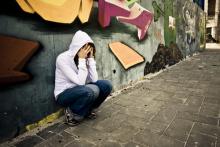
How do you love your neighbor when your neighbors sell drugs and exploit young women? I’m serious — this is a legitimate question that I am asking myself a lot lately and I am not sure I have the answer.
Nine years ago my wife and I moved into East Oakland to become a part of a small church community called New Hope and to direct InterVarsity’s Urban Project in the Bay Area. We’ve weathered some challenging experiences: stolen cars, physical assault, hearing a lot of shootings, witnessing a shooting, breaking up domestic violence, seeing a friend’s family torn apart by domestic violence, and endless amounts of trash on the streets. Don’t get me wrong, there is a lot to love about our neighborhood and community, but in recent months I think I’ve reached my limit.
The family that recently moved in across the street is friendly. The folks hanging out on the porch and the kids playing tetherball off the street sign honestly do contribute to the vibrant life of the block. But when I saw a total of 12 drug deals go down in broad daylight in the span of three days, loving my neighbor became a lot harder.

Over the last several weeks, I’ve been trying to figure out exactly why I feel so bothered by Sheryl Sandberg’s book, Lean In.
I suggested to my husband that maybe I’m being defensive since I am an educated woman in a professional field who has very clearly chosen to “lean out” to spend more time at home.
Or maybe it’s because I disagree with putting any degree of blame for inequality in the workforce on women.
Or maybe it’s because I don’t like the idea of human capital.
None of those reasons, however, seem to explain why the book and the phrase “lean in” have become such an obsession for me. I certainly consider myself a huge proponent of equality and women’s rights. I have marched, protested, researched, worked toward, and fought for true equality for women all of my adult life.
So my discomfort with Sandberg’s book isn’t because I’m anti-woman or anti-feminist. It isn’t because I disagree with her and want all moms to stay home and bake cookies and volunteer for PTA. It isn’t even because I feel the need to defend my choice to be a 99-percent stay-at-home mom. Instead, it’s because, as a Christian, I believe that the whole idea of “leaning in” does not take into account the principle of putting others before self. (Phil. 2:3-8). This principle applies equally to both women and men.
(Caveat: neither women nor men should be trapped into subservience by children and/or spouse. I am talking about putting the real, rational, and loving needs presented by being part of a family before one’s individual needs.)
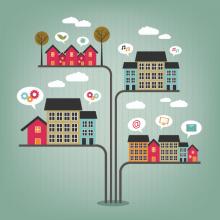
The Christian Community Development Association (CCDA) has been a powerful force for Christian social action over the past decade. CCDA's leadership development, resources, and vision have been powerfully focused on helping pastors and community leaders facilitate the restoration of communities all over the country and around the world.
Born out of the traditions of the civil rights movement, CCDA is now engaging a new generation of pastors, prophets, and ministers. This next generation of CCDA will naturally look somewhat different from previous generations as they respond to the ever-changing landscape of our society. As it turns out, one major difference is a hunger among leaders for a more robust and powerful theological foundation from which to pursue ministry.
Practics has long dominated the field of Christian social action. What works? What strategies and techniques will actually bring about change in our community? These have been the central questions of past generations. However, among a new generation of church and community leaders, practical questions are not the sole concern, and in some cases not even the primary concern.
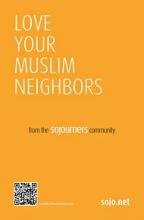
The racist, anti-Muslim ad in the New York Subway that used the language of civilized and savages has more than met its match.
A large group of Jews and Christians have countered that hateful message by tapping into the rich mines of neighborly love that are at the heart of Jewish, Christian, and Islamic traditions.
New ads by Rabbis for Human Rights , United Methodist Women, and Sojourners have tapped into the rich religious commandment to “love thy neighbor” to remind all of us to love our neighbors.